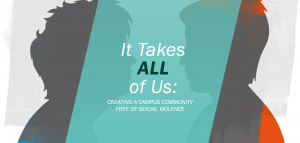Sexual violence is a ubiquitous concern at McGill University. Archived online threads and blog posts accuse various professors of sexual misconduct. Current students, aware of these stories, often hesitate to enroll in certain courses, or express doubt in the university’s willingness to protect them when disclosing their own experiences. In the public sphere, activists in Montreal have taken to the streets throughout the past few years, calling on their universities to take a stronger stance against sexual violence perpetrators.
In early September, McGill University brought the topic of sexual violence directly into the spotlight (and our MyCourses home pages) with the program It Takes All of Us. The training consists of four modules: Sexual Violence, Consent, Bystander Intervention, and Supporting Survivors. In addition to definitions and education, the program presents students with interactive scenarios. These include steps for determining consent under the influence or in cases of power imbalances, acting as an effective bystander, or providing appropriate support to survivors of sexual violence.
The modules have received praise from those who see them as following through on McGill’s 2016 Policy Against Sexual Violence, though they have also faced criticism for lacking important elements. Is this training a step towards increased accountability for perpetrators of inappropriate sexual conduct at McGill? Does it take into account the past requests of activists and adequately address McGill’s specific history? To explore these questions, The Bull & Bear sat down with various stakeholders in the school community involved in anti-sexual violence advocacy to illuminate the process and meaning behind this program.
Community Effort
Developed (at least partially) in response to Quebec’s 2017 law Bill 151, It Takes All of Us is mandatory for all McGill students and staff. Bill 151 mandates that higher education institutions implement sexual violence education programs by September 1, 2019. Although the details are vague, this act requires universities to make an effort to “help foster a healthy and safe living environment for students and personnel members.”
Sexual violence is a campus issue.
One source of contention is the program’s staggered timeline for different members of the community. All Orientation Week participants were required to complete the module in August. Weeks later, returning students gained access. Students who fail to complete the module prior to November 29 will not be able to register for courses next semester. Staff members, on the other hand, are not given access until January 2020, leaving them without this training for the entire Fall semester.
While Dean of Students, Christopher Buddle, says that these deadlines are intended to align with the staff performance review period, some members of the community are not pleased. SSMU VP Internal Sanchi Bhalla told CBC News, “The fact that students are being held to a different standard than staff and faculty is absolutely ridiculous.”
McGill Law Professor Angela Campbell, who serves as Associate Provost for Equity & Academic Policies, was in charge of the program’s creation. Campbell responded to some students’ concerns, noting that the module is only “one piece of a larger effort to raise awareness and education.”
Campbell expressed that rates of reporting and disclosure will likely increase as a result of heightened exposure to resources included in the training. “Does this mean the incidences are going up? I don’t think so,” Campbell said. She added, “By itself, an online program will not be able to do the work of prevention … Our goal is prevention, to the extent that we can [prevent sexual violence].”
Student Consultation and Past Advocacy
The process of creating It Takes All of Us involved a long, thorough procedure that consulted various institutions, including Concordia’s Sexual Assault Resource Centre coordinator Jennifer Drummond, McGill Equity Facilitator Eve Finley, and student interns at the Office for Sexual Violence Response, Support and Education (OSVRSE). According to Dean Buddle, this formation involved significant efforts and financial resources. Still, some criticize this process for failing to include the student body.
SSMU VP External Adam Gwiazda-Amsel said that the efforts displayed in the program “do not engage with what students were asking for in 2016 and again in 2018. Those open letters have been more or less ignored, with the university instead doing [the] minimum to comply with Bill 151.”
By itself, an online program will not be able to do the work of prevention [of sexual violence].
According to an emailed statement from SSMU Anti-Sexual Violence Mobilization and Advocacy Commissioner Maeve Botham and SSMU VP University Affairs Madeline Wilson, the university only attempted to consult students regarding the module’s creation once, during a focus group in Winter 2019. “This is unacceptable,” their statement reads. “Since our initial criticisms, we have continuously been told that [the administration] is focusing now on rolling out the module, and will not look at incorporating our feedback until much later this year.”
Additionally, while the module includes a section on the ambiguity of consent in the presence of a power imbalance, which addresses the necessity of the involved faculty member to submit a report, many in the McGill community have espoused beliefs that this measure is insufficient. Wilson and Botham noted that the university has yet to address the demands of the 2018 student walkout, which include launching a third-party investigation into the Office of the Dean of Arts on the handling of complaints against faculty members.
Many students have posted on online platforms, such as the McGill subreddit, to express dissatisfaction with the initiative. Some perceive that the program is simply a liability measure or only for the purpose of complying with provincial law, calling the material repetitive, patronizing, and unrealistic. One user even expressed that McGill seems to be simply implementing the program to protect itself for insurance purposes.
Responding to the feedback directed at the nature of the material, Dean Buddle indicated that the module may be “the first time many students gain exposure to this content in a North American setting.”
Conversely, Botham and Wilson pointed out that, while the training is a crucial response from the university, it “builds on the work that was already taking place on campus,” citing projects like Our Shared Spaces (formerly known as Rez Project), and informational workshops given by volunteers from the Sexual Assault Centre of the McGill Students’ Society (SACOMSS). “This was an initiative that was started by students who saw a need for this education in residences and that the module is not the first time this kind of education has been provided,” they wrote.
Although the module may attempt to respond to McGill’s specific history, this type of training is neither entirely original nor unique to McGill: Dean Buddle noted that members of the administration modeled the program after online harassment training in Ontario as well as Concordia University’s sexual violence prevention modules.
Survivor-Centered?
Concern has emerged regarding how survivors of sexual violence will be expected to engage with the program, given its sensitive and potentially triggering subject matter.
A pop-up at the bottom of the module as well as a sidebar on MyCourses urges anyone who feels overwhelmed or unable to complete the module due to its sensitive subject matter to visit or contact the OSVRSE. Sexual Violence Response Advisor Émilie Marcotte explained that such students should contact the office for support and will be “evaluated…on a case-by-case basis according to their needs”, which may in some cases require an exemption from the Program Managers.
[It Takes all of Us] is a form of education, but it is insufficient for it to be the only form of education.
Marcotte wrote in an emailed statement: “In highlighting available resources on and off campus, the goal is that it will also increase access for our community members who have been impacted by sexual violence.” In addition to support for the program, the OSVRSE provides legal support for survivors, as well as group sessions.
Yet an editorial by the McGill Tribune suggests that the office may require more staffing, funding, and resources, and is currently “realistically unable to accommodate all of the students who might want help.”
Indeed, the office is fairly small in relation to the size of the student body. In terms of allocation of resources in the future, Marcotte stated that the Policy Against Sexual Violence’s Implementation Committee will evaluate the OSVRSE and make recommendations based on its findings. However, this review will not be completed until the end of the Winter 2020 semester, so it is unlikely that evaluation data will be publicly available before then.
Does It Take More?
Professor Campbell bluntly noted that “sexual violence is a campus issue.” She said, “The degree and scope [of sexual violence], I don’t think we fully understand. It’s linked to a bunch of issues, but I would definitely say it is one of the key concerns on any campus.”
When asked whether or not the module signals a turn towards greater accountability for those in positions of power, Botham and Wilson responded that while it is good that the university recognizes its responsibility to address issues surrounding sexual violence, it alone is inadequate: “If the university wants to hold abusive professors accountable, they need to take more proactive steps to strengthen university policies.”
Wilson and Botham emphasized the importance of addressing students’ past advocacy and specific demands in the future, calling the module “just one piece of the puzzle.”
“It is a form of education, but it is insufficient for it to be the only form of education,” Botham and Wilson wrote. “The education that students receive is only impactful if there is meaningful support for survivors, if there are ways that [survivors] can find justice, and [if] people who cause harm are held accountable.”










Well-written article but factually incorrect in the articulation of details. For example, teaching/academic staff actually got access to the modules in September, as detailed on the website, at the same time as returning students Many more educational initiatives take place through the OSVRSE but absolutely none are highlighted here.